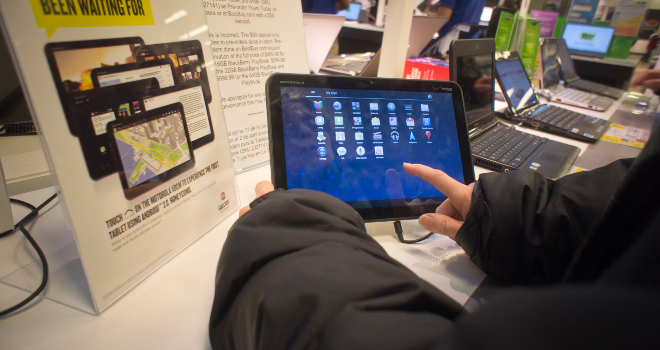When Google CEO Larry Page announced the company’s landmark acquisition of Motorola Mobility Monday morning, he characterized the move as both a boost for competition in the mobile marketplace as well as a defensive one.
Calling Motorola an innovator that’s used its intellectual property to drive innovation in the mobile marketplace for the past 80 years, Page said in a blog post that he’s excited to work with Motorola to “accelerate innovation in this space.”
At $12.5 billion, the acquisition is Google’s biggest in its corporate history, and gets it Motorola’s 17,000 patents.
But in his blog post, Page also claimed that Google has been a victim of anticompetitive behavior by Apple and Microsoft.
“We recently explained how companies including Microsoft and Apple are banding together in their anti-competitive patent attacks on Android,” he wrote. “The U.S. Department of Justice had to intervene in the results of one recent patent auction to ‘protect competition and innovation in the open source software community’ and it is currently looking into the results of the Nortel auction. Our acquisition of Motorola will increase competition by strengthening Google’s patent portfolio, which will enable us to better protect Android from anti-competitive threats from Microsoft, Apple, and other companies.”
But other financial analysts and market observers note that it’s the Asian mobile handset makers that may be quaking in their boots — and the move may indeed drive competition in a way not described by Page in that it may drive those handset makers into the arms of Microsoft.
Google licenses its mobile Android operating system to those manufacturers, and collectively, they’ve helped Android become the dominant global mobile operating system with 150 million devices activated worldwide, according to the research firm Canalys.
As in other markets, Google is pushing the antitrust envelope by jumping into a market where it previously was primarily acting as the platform provider.
This is prompting analysts to note that they expect strict scrutiny from antitrust regulators before they approve the merger.
“I expect that they will give Google a rough time,” Brian White, a financial analyst at Ticonderoga Securities told TheStreet.com. “In the PC market, Google dominates search, and now it’s trying to dominate mobile, so that will raise some questions.”
Meanwhile, Charles Golvin, a Forrester Research analyst, told the Wall Street Journal that the Motorola deal is a “risky move,” saying that buying a hardware maker that competes with its mobile operating system licensees isn’t going to “endear them to the rest of their customers.”
Nevertheless, Google’s chief legal officer David Drummond said in a conference call that the company thinks the transaction is “competitive.”
The acquisition is sure to be examined in depth on Capitol Hill in September when Google’s Executive Chairman Eric Schmidt is scheduled to testify in front the Senate Judiciary’s antitrust subcommittee.
Google hasn’t been as aggressive as some in Silicon Valley in actively applying for patents, which leaves it vulnerable to patent infringement lawsuits. Notably, Apple has stepped up its patenting activity significantly in recent years, becoming one of the top recipients of patents in recent years. It also of course participated in the massive Nortel auction of mobile patents.
Some companies, such as networking giant Cisco, run business committees that meet on a regular basis to troll through new ideas that engineers might have and tag them for their potential to be patented. Some engineers at Cisco are given bonuses for coming up with ideas that can be patented.









